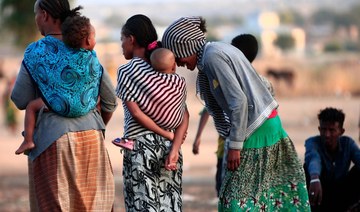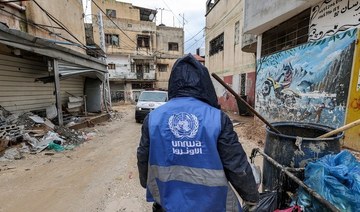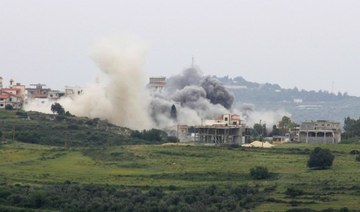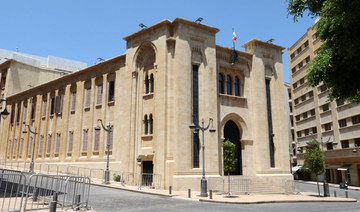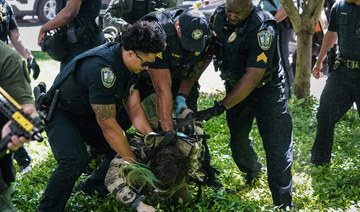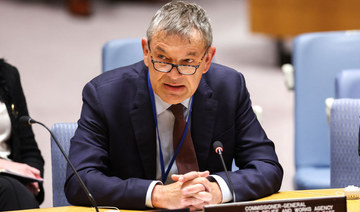CAIRO: Sudan boycotted talks on Saturday between Nile Valley countries over Ethiopia’s controversial mega-dam, calling on the African Union to play a greater role in pushing forward the negotiations that have stalled for years.
It was the first time that Sudan refused to attend talks with Ethiopia and its northern neighbor Egypt, which has expressed for years its fears that the Ethiopian Grand Renaissance dam on the Blue Nile will dramatically threaten water supplies downstream.
Sudanese Irrigation Minister Yasser Abbas said in a statement that the current approach to reaching a tripartite agreement on the filling and operation of Ethiopia’s dam had not yielded results, and the AU should do more to “facilitate the negotiation and bridge the gab between the three parties.”
Sudan’s boycott, however, could derail the complicated talks, which the AU has already taken the lead role in supporting.
On Thursday, the foreign and irrigation ministers of the three Nile Valley countries met online, two weeks after they failed to agree on a new framework for negotiations.
There were no immediate comments from South Africa, which heads the African Union, Egypt or Ethiopia to Saturday’s move by Sudan. It was not clear when they would restart negotiations.
Africa’s largest hydroelectric dam has caused severe tensions with Egypt, which has called it an existential threat and worries that it will reduce the country’s share of Nile waters.
Ethiopia says the $4.6 billion dam will be an engine of development that will pull millions of people out of poverty. Sudan, in the middle, worries about the effects on its own dams, though it stands to benefit from access to cheap electricity.
Key questions remain about how much water Ethiopia will release downstream if a multi-year drought occurs and how the three countries will resolve any future disputes. Ethiopia has rejected binding arbitration at the final stage of the project.
As well as tension with its Nile Valley neighbors, Ethiopia was plunged earlier this month into a deadly internal conflict when its federal government launched a military attack on the northern Tigray region’s administration.
The conflict threatens to pull in Ethiopia’s neighbors, which include Sudan, Somalia and Eritrea, whose capital came under rocket attack from the Tigray forces over the weekend. The fighting has sent over 35,500 Ethiopian refugees into Sudan.
Ethiopia rejected a US-crafted draft deal over its dam in February and went on with the first stage of filling of the dam’s massive reservoir, leading Washington to suspend millions of dollars in aid to Addis Ababa.
Sudan boycotts faltering talks over Ethiopia’s mega-dam
https://arab.news/p89h6
Sudan boycotts faltering talks over Ethiopia’s mega-dam
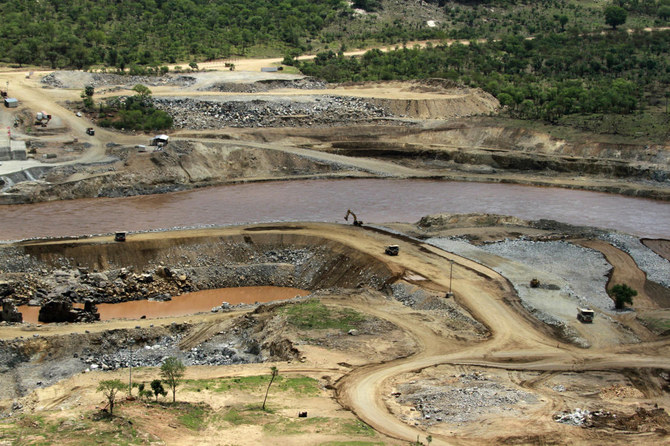
- It was the first time that Sudan refused to attend talks with Ethiopia and its northern neighbor Egypt
- Abbas said in a statement that the current approach to reaching a tripartite agreement on the filling and operation of Ethiopia’s dam had not yielded results
Turkiye’s Erdogan postpones tentative White House visit, sources say
The source familiar with the matter, speaking on condition of anonymity, said it was unclear what prompted the postponement
WASHINGTON/ANKARA: Turkish President Tayyip Erdogan has postponed a White House meeting with President Joe Biden, a source familiar with the situation and a Turkish official said on Friday of a visit that had been tentatively planned for May 9.
A White House spokesperson, while not confirming the May 9 date, said: “We look forward to hosting President Erdogan at the White House at a mutually convenient time, but we have not been able to align our schedules and do not have any visit to announce at this time.”
A new date will soon be set due to a change in Erdogan’s schedule, the Turkish official said, requesting anonymity. The source familiar with the matter, speaking on condition of anonymity, said it was unclear what prompted the postponement.
The White House never formally announced the visit but a US official told Reuters in late March that following Turkish Foreign Minister Hakan Fidan’s visit to Washington, the White House offered and Ankara had accepted May 9 for a meeting between Biden and Erdogan.
That would have been the first bilateral visit to Washington since 2019 when Erdogan met with then President Donald Trump, a Republican. He and Biden have met a few times at international summits and spoken by phone since the Democratic US president took office in January 2021.
Ties between the US and Turkiye have been long strained by differences on a range of issues. While they have thawed since Ankara ratified Sweden’s NATO membership bid earlier this year, tensions persist over Syria and Russia and the war in Gaza.
Erdogan visited neighboring Iraq this week. Last weekend, he met with Hamas leader Ismail Haniyeh in Istanbul, the first meeting between Erdogan and a Hamas delegation headed by Haniyeh since Israel began its military offensive in the Gaza Strip following Hamas’ Oct. 7 attack.
Netherlands will consider resuming support to Palestinian UNRWA agency
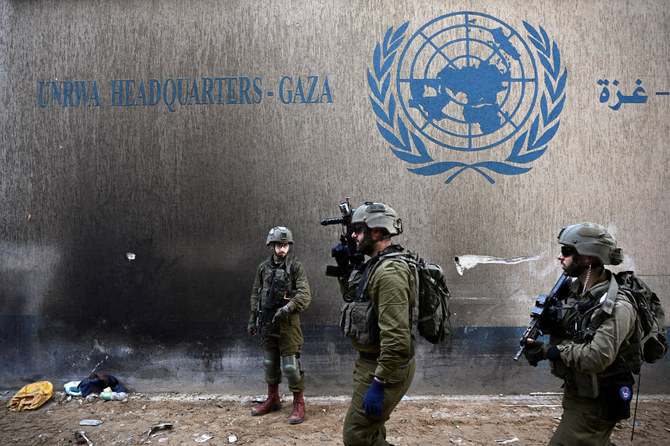
- The decision follows an investigation by the former French foreign minister Catherine Colonna
- The Colonna-led review of the agency’s neutrality concluded Israel had yet to back up its accusations
AMSTERDAM: The Dutch government on Friday said it would consider resuming funding for the UN agency for Palestinians (UNRWA) in Gaza if the agency implements recommendations to strengthen its neutrality.
The decision follows an investigation by the former French foreign minister Catherine Colonna released on Monday into whether some UNRWA employees were involved in the Oct. 7 attack by Hamas.
The Colonna-led review of the agency’s neutrality concluded Israel had yet to back up its accusations that hundreds of UNRWA staff were operatives in Gaza terrorist groups.
The Dutch government said it had already given its yearly donation to UNRWA in January, before the accusations against the agency came to light. It was one of several European countries that paused funding for the agency after the allegations were levied.
It said it did not foresee any additional donations in the near future, but would consider UNRWA as a potential partner if requests for aid were made.
150 shells hit Lebanese border towns in response to Israeli’s killing
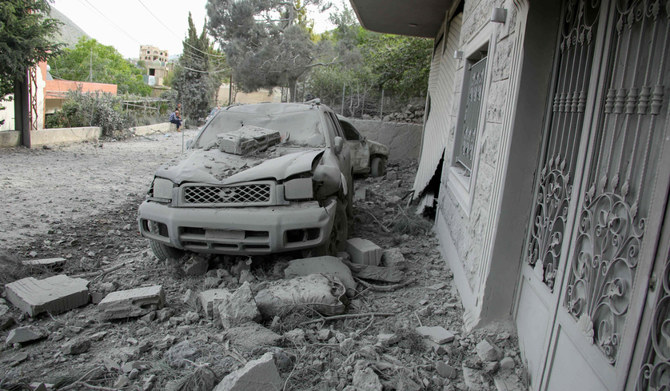
- 200 days of Israeli attacks against Lebanon have resulted in 1,359 casualties, including 344 deaths, ministry of health says
BEIRUT: The Israeli army responded on Friday to the combined operation carried out by Hezbollah in the occupied Shebaa Farms district — also known as Har Dov — with artillery shelling and airstrikes targeting the Tumat Niha area on the outskirts of Western Bekaa.
An Israeli was killed near the country’s northern border in a Hezbollah attack.
Israeli forces launched an airstrike on the outskirts of Shebaa and fired artillery shells on the outskirts of the town of Kfarchouba at dawn.
The outskirts of Shebaa, Kfarchouba and Helta were targeted with more than 150 Israeli shells.
Hezbollah members set up on Thursday night a “combined ambush of guided missiles, artillery, and rocket weapons targeting an Israeli motorized convoy near the Ruwaizat Al-Alam site, in the occupied Lebanese Kfarchouba hills.”
When the convoy arrived at the ambush point, according to Hezbollah’s statement, “it was targeted with guided weapons, artillery and rockets, destroying two vehicles.”
The party said that the Israeli army created a “smokescreen to retrieve losses.”
Hezbollah announced “targeting an Israeli force as it made it to the entrance of Al-Malikiyah site with artillery fire, and it was directly hit.”
The Israeli army confirmed the killing of a truck driver, Sharif Sawaed — a resident of Wadi Salameh — by an anti-tank shell fired by Hezbollah toward Shebaa Farms.
The Israeli army said that Sawaed was carrying out infrastructure work in the area targeted by the shell, where efforts are underway to set up a barrier on the border.
The Israeli army said that it “succeeded in retrieving the body of the dead soldier after a complex operation that lasted for hours under fire.”
The Israeli army said that warplanes later shelled Hezbollah positions in the villages of Kfarchouba and Ain Al-Tineh, a weapons depot, and a Hezbollah rocket launch pad in the Markaba area in southern Lebanon, and that two anti-tank shells were observed from Lebanese territory toward Shebaa Farms.
Israeli airstrikes led to the destruction of a house in Shebaa, two houses in Kfarchouba, and damage to more than 35 houses. One house was destroyed in Yarine, and another was destroyed in Dhayra.
Israeli artillery shelling targeted the area between the border towns of Yarine and Jebbayn.
Israeli newspaper Yedioth Ahronoth reported that the Israeli army launched an investigation into the Har Dov incident, as the engineering force was supposed to operate in the dark to avoid being targeted by Hezbollah’s missiles.
Israeli army spokesperson described what happened in the Shebaa Farms as “a difficult security incident on the Lebanese border.”
This was the first confrontation during which the Israeli army revealed details of casualties and the developments taking place at the target site.
The head of the Israeli Metula settlement council said: “It is insane how we lose houses and infrastructure every day,” adding that “Hezbollah is systematically and deliberately hurting the people of the north by doing so.”
He said that Hezbollah had “successfully deepened the security belt here after it made us flee the northern settlements.”
The Israeli army’s radio station has reported the death of 20 settlers on the Lebanese border since the start of the war more than 200 days ago.
An Israeli military drone struck a car on the Dhahira–Zalloutieh road in the border region.
The Israeli attacks against Lebanon, which have continued for 200 days, resulted in “1,359 casualties, including 344 dead people, most of whom are men,” according to a report published by the Lebanese Ministry of Health.
Israeli media outlets stated that “4,000 missiles were launched toward northern Israel from Lebanon since the beginning of the Gaza war, according to the Israeli army’s estimations.”
Hezbollah provided a detailed overview of the course of the military operations on the Lebanese southern border, stating that “it killed and wounded 2,000 Israeli soldiers, and carried out 1,650 diverse attacks, including downing five drones and targeting 67 command centers and two military factories.”
The group added that it carried out 55 aerial attacks and forced 230,000 settlers to evacuate 43 northern settlements.
Lawyer for arrested Palestinian academic warns move could set ‘precedent’ for free speech in Israel
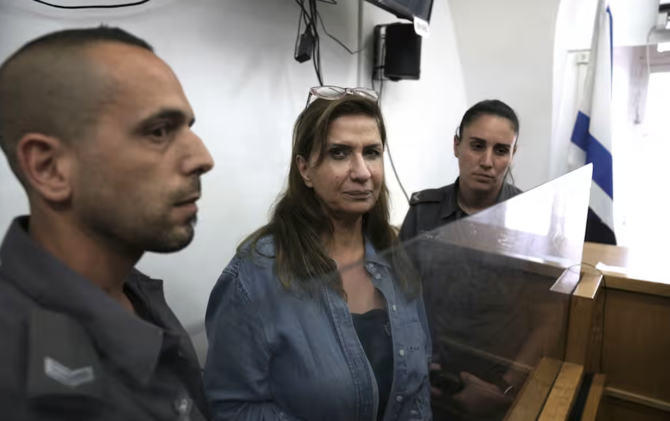
- Nadera Shalhoub-Kevorkian was detained for appearing on podcast to discuss state violence, genocide
- Hundreds of Palestinian citizens of Israel have been detained since Oct. 7 over criticism of Israel
LONDON: The lawyers for a Palestinian legal scholar arrested on April 17 have said her detention was “political” and could set a “precedent” for the treatment of academics and free speech in Israel.
Prof. Nadera Shalhoub-Kevorkian, a leading feminist academic with roles at the Hebrew University of Jerusalem and Queen Mary, University of London, was arrested after appearing on a podcast in March in which she discussed her work on state crimes, genocide, violence and surveillance in the context of the war in Gaza.
She was strip-searched by police, interrogated and denied access to food, water and medication for several hours, and held in a cold cell overnight before being bailed the next day. A number of her personal items, including posters and books, were also confiscated.
Hassan Jabareen, her lawyer and director of human rights organization Adalah, said: “This is not only about one professor, it could be a (precedent) for any academic who goes against the consensus in wartime.”
Israeli police claimed that she was being investigated on suspicion of incitement to terrorism, violence and racism, but a magistrate deemed she did not pose a threat after she was arrested, leading to her release.
Hundreds of Palestinian citizens of Israel have been arrested since the outbreak of hostilities after Oct. 7, with many detained for criticism of Israel.
All arrests in relation to freedom of speech issues must be signed off by Israel’s attorney general, and Shalhoub-Kevorkian has been ordered to return to face further questioning at the weekend.
Jabareen said: “They could have asked her to come to the police station for two or three hours to discuss, investigate.
“To carry out the arrest like that, as if she was a dangerous person, shows the main purpose was to humiliate her.
“It was illegal, that’s why the magistrates court accepted my argument that she should be released and the district court confirmed it.”
She added: “If they indict her, this might have a deeply chilling effect. It’s very difficult to prosecute a person for academic work … but the political situation in Israel is starting to not really be based on the rule of law.”
International academics have condemned Shalhoub-Kevorkian’s arrest and treatment, with over 100 colleagues from the Hebrew University of Jerusalem publishing a letter in support of her.
In addition, 250 academics at Queen Mary have signed a separate letter saying: “Academic freedom (in Israel) has come under sustained attack.”
In the Hebrew University academics’ letter, published by Israeli newspaper Haaretz, her colleagues said: “Regardless of the content of Nadera’s words, their interpretation and the opinions she expressed, it is clear to everyone that this is a political arrest, the whole purpose of which is to gag mouths and limit freedom of expression. Today it is Nadera who stands on the bench, and tomorrow it is each and every one of us.”
The Hebrew University also issued a short statement of support, despite the fact that in 2023 she was briefly suspended and asked to resign by the university’s rector after she called for a ceasefire in Gaza and suggested Israel could be guilty of genocide.
“We strongly object to many of the things that Prof. Shalhoub-Kevorkian said. Nonetheless, as a democratic country, there is no place to arrest a person for such remarks, however infuriating they may be,” it said.
Gaza baby rescued from dead mother’s womb dies

- Doctors were able to save the baby, delivering her by Caesarean section
- The baby suffered respiratory problems and a weak immune system, said Doctor Mohammad Salama who had been caring for Sabreen Al-Rouh
RAFAH, Gaza Strip: A baby girl who was delivered from her dying mother’s womb in a Gaza hospital following an Israeli airstrike has herself died after just a few days of life, the doctor who was caring for her said on Friday.
The baby had been named Sabreen Al-Rouh. The second name means “soul” in Arabic.
Her mother, Sabreen Al-Sakani (al-Sheikh), was seriously injured when the Israeli strike hit the family home in Rafah, the southernmost city in the besieged Gaza Strip, on Saturday night.
Her husband Shukri and their three-year-old daughter Malak were killed.
Sabreen Al-Rouh, who was 30-weeks pregnant, was rushed to the Emirati hospital in Rafah. She died of her wounds, but doctors were able to save the baby, delivering her by Caesarean section.
However, the baby suffered respiratory problems and a weak immune system, said Doctor Mohammad Salama, head of the emergency neo-natal unit at Emirati Hospital, who had been caring for Sabreen Al-Rouh.
She died on Thursday and her tiny body was buried in a sandy graveyard in Rafah.
“I and other doctors tried to save her, but she died. For me personally, it was a very difficult and painful day,” he told Reuters by phone.
“She was born while her respiratory system wasn’t mature, and her immune system was very weak and that is what led to her death. She joined her family as a martyr,” Salama said.
More than 34,000 Palestinians, many of them women and children, have been killed in the six-month-old war in Gaza between Israel and Hamas militants, according to the Gaza health ministry. Israel denies deliberately targeting civilians in its campaign to eradicate Hamas.
Much of Gaza has been laid to waste by Israeli bombardments and most of the enclave’s hospitals have been badly damaged, while those still operating are short of electricity, medicine sterilization equipment and other supplies.
“(Sabreen Al-Rouh’s) grandmother urged me and the doctors to take care of her because she would be someone that would keep the memory of her mother, father and sister alive, but it was God’s will that she died,” Salama said.
Her uncle, Rami Al-Sheikh Jouda, sat by her grave on Friday lamenting the loss of the infant and the others in the family.
He said he had visited the hospital every day to check on Sabreen Al-Rouh’s health. Doctors told him she had a respiratory problem but he did not think it was bad until he got a call from the hospital telling him the baby had died.
“Rouh is gone, my brother, his wife and daughter are gone, his brother-in-law and the house that used to bring us together are gone,” he told Reuters.
“We are left with no memories of my brother, his daughter, or his wife. Everything was gone, even their pictures, their mobile phones, we couldn’t find them,” the uncle said.




